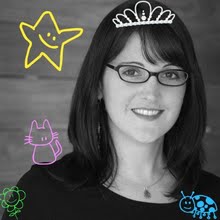What Feminism Means To Me: Criss L. Cox

Criss L. Cox
Today’s post comes from Criss L. Cox, and is part of a Salon of blog posts asking feminists to define what feminism means to them. You can follow Criss on Twitter and read her blog.
I used to think “feminists” were angry man-haters who burned bras and didn’t shave their armpits. I didn’t want to be one of them — I liked men! I wanted to marry one someday. I wanted a big wedding, with a pretty white dress, and I wanted to have kids, and I wanted to stay home with my kids. Feminists hated women who wanted to quit their jobs to stay home and raise their kids, right?
Um, WRONG. Sure, there are radical extremists in every group (my sister, a SAHM (stay at home mom) and a feminist, was called out on her blog a while back by an angry commenter who accused her of setting the women’s movement back several decades, because my sister stayed home to raise her son), but those extreme outliers are not a true representation of the group or movement.
I would like to stay home with my kids, when I have them, because I like kids. I’ve spent my adult life working with children, from toddlers and infants in daycare centers to high schoolers in my teaching jobs to elementary kids in Sunday school classes at church. Kids are my thing, so when I have some of my own I want to spend as much time with them as possible.
I also have a Bachelor’s degree and I’m four credit hours away from a Master’s; I have ample experience in the workplace, and I know I can support myself (and those potential future children) if need be. If my husband and I can afford the luxury of my staying home with our potential future kids, I will still continue blogging, writing, and if in any way possible I’ll sneak in classes toward my PhD. I, like my sister, am far from your stereotypical 50’s housewife stay-at-home mom.
Feminism isn’t about telling women (or anyone) what to do; it’s about giving women, and anyone else, the right to choose for themselves what they want to do. Our job is to make sure every option is open to everyone.
Feminism isn’t limited to females, either. It’s not about ending oppression for women (which, oftentimes unfortunately is shorthand for “white, heterosexual, cis, able-bodied women”), but about ending oppression for all marginalized groups. After all, women are half of the world’s population, and in that group, you will find all sorts of women. When we fight for “women” we must fight for ALL these women.
Feminism isn’t even just about women (all women). While gender roles have traditionally put women in a more submissive role and held us back, men are also harmed and limited by gender roles. In a way, we women have the advantage over men in this area: Women can pop open a beer and watch the football game, but a guy is going to get funny looks if he enjoys a nice glass of white zinfandel and goes to see the ballet (unless he has a girl with him, and she’s, like, “making him”). Feminists work to change gender roles so both men and women are free to make whichever choices their little hearts desire without having to censor or deny themselves because of society’s small-minded expectations.
Feminist movement has moved beyond the work-or-stay-home-with-kids issue. While we must continue the work that has been done on that front (to ensure women are treated equally in the workplace and that girls have access to education so they can compete on a more even field with men in the workplace), we have so many other issues to tend to as well.
Unfortunately, one of those issues is getting others to understand what we are actually about. First of all, it’s not about YOU, it’s about ME. When I fight for women’s rights, reproductive rights, LGBT rights, etc., I’m not telling you what YOU need to do or how YOU need to live your life. I’m telling you how I want to live my life; all you have to do is LET ME. Stop passing laws that stop me or limit me or oppress me. Your right to work full-time and be a CEO of whatever company does not in any way interfere with my right to choose a career in education, a typically female-dominated (and underpaid) field, nor does it interfere with my sister’s right to stay at home with her child. My choice does not diminish yours any more than yours diminishes mine.
Another pressing item on the agenda is to dispel the myth of the scary, hairy-armpitted feminazi. Women — and man — need to be proud to call themselves feminists. It is not a dirty word! Embracing feminism is merely embracing the idea that none of us — male, female, gay, bi, hetero, cis, trans, abled, disabled, thin, fat, and everything around and in-between — deserve to be treated with respect. You know, unlike a doormat.
To read all of the What Feminism Means To Me Salon posts, click here.
What a great post, Criss!
Danine
http://www.danine.net
Pingback:uberVU - social comments